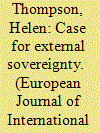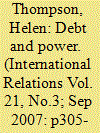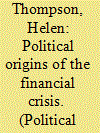| Srl | Item |
| 1 |
ID:
071780


|
|
|
|
|
| Publication |
2006.
|
| Summary/Abstract |
Critics of sovereignty have argued that it produces outcomes that violate universal moral principles. This article offers a qualified defence of external sovereignty by returning to some of the arguments first deployed to support claims to it. The article argues that if claims to external sovereignty are understood in part as a critique of the ambitions of powerful states, then the presumption of it in international politics, not as an absolute value but a crucial consequential consideration, could act as a restraint on the power of the world's strongest states by making justifications for war somewhat more difficult.
|
|
|
|
|
|
|
|
|
|
|
|
|
|
|
|
| 2 |
ID:
078890


|
|
|
|
|
| Publication |
2007.
|
| Summary/Abstract |
The United States' borrowing poses a potential threat to its long-term external power. This is not because the United States' fiscal debt is large in relative terms, or because rising debt necessarily threatens a state's power, but because the United States has now indebted itself to China, and this financial relationship fundamentally changes the political terms on which the United States has borrowed since the 1960s. The consequences of that change may force American presidents to consider questions about the domestic viability of their foreign policy in a way that has not been necessary since the beginnings of the Cold War. Neither liberals nor realists are equipped to understand the significance of this change, because of the way in which they conceive power in relation to the interaction between domestic and international politics.
|
|
|
|
|
|
|
|
|
|
|
|
|
|
|
|
| 3 |
ID:
096539


|
|
|
| 4 |
ID:
155407


|
|
|
|
|
| Summary/Abstract |
the election of 8 June was supposed to be about Brexit. In actuality, the election morphed into one about austerity and how not to fund social care for an ageing population. Put more schematically, it became an election borne of the extraordinary consequences of the 2008 crash and what they have entailed for intergenerational conflict in an ageing society. Although Brexit has its own historical origins,1 it is also a singular contingency in a political world that is being shaped by structural forces set in place by the policy response to 2008. In this political world, politicians cannot frame what elections will be about—even when the stakes are as high as they are for Brexit. Instead, the structural economic forces at work will keep manifesting themselves—even when, on the surface of what happens, they are difficult to see.
|
|
|
|
|
|
|
|
|
|
|
|
|
|
|
|
| 5 |
ID:
086967


|
|
|
|
|
| Publication |
2009.
|
| Summary/Abstract |
For much of the last decade it was clear that the commercial operations of the government-sponsored enterprises Fannie Mae and Freddie Mac were creating an increasing systemic financial risk. That risk was compounded by the fact that the Japanese and Chinese central banks were acting as cheap creditors. The Bush administration and some Republicans in Congress made efforts from 2001 to create a tougher regulatory framework for Fannie and Freddie. Fannie and Freddie were able to defeat these attempts to constrain their operations by a four-fold political strategy involving campaign contributions to members of Congress, a vast lobbying apparatus, the cultivation of a political language around affordable housing for minorities, and abusing and smearing their regulator. Since Japan and China understood that the US government would have to assume Fannie and Freddie's liabilities in a crisis they had no incentive to expose the political fiction that it would not.
|
|
|
|
|
|
|
|
|
|
|
|
|
|
|
|
| 6 |
ID:
138266


|
|
|
|
|
| Summary/Abstract |
GOVERNMENTS across the developed world still face acute fiscal difficulties. Even where, as in Britain, there has been a return to sustained moderate economic growth, the recovery has not produced a comparable rise in tax revenue. Despite the rise in employment in the British economy since 2011, tax receipts from income tax have fallen substantially. A recovery in significant part based on part-time jobs and self-employment has not, and cannot, repair Britain's fiscal hole, particularly since the Coalition government has raised the tax-free allowance on income. Internationally governments have made little progress on cooperative measures to address the revenue lost to tax havens and aggressive tax avoidance.
|
|
|
|
|
|
|
|
|
|
|
|
|
|
|
|